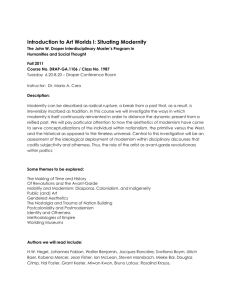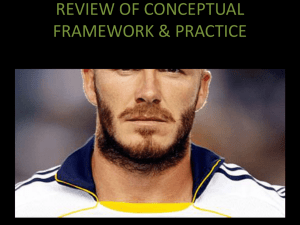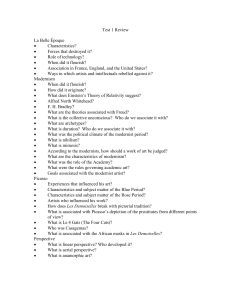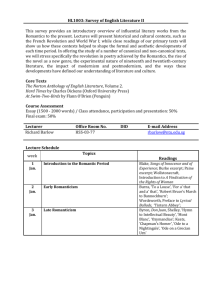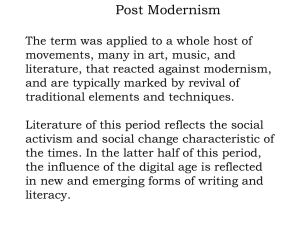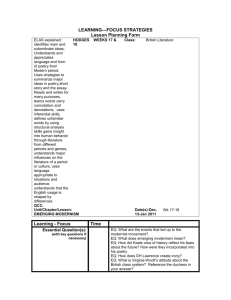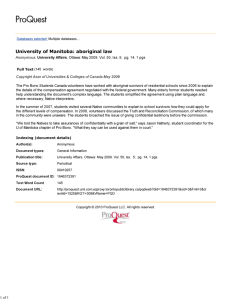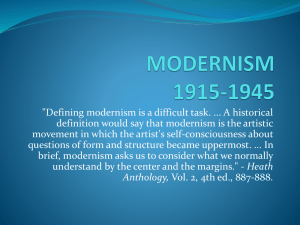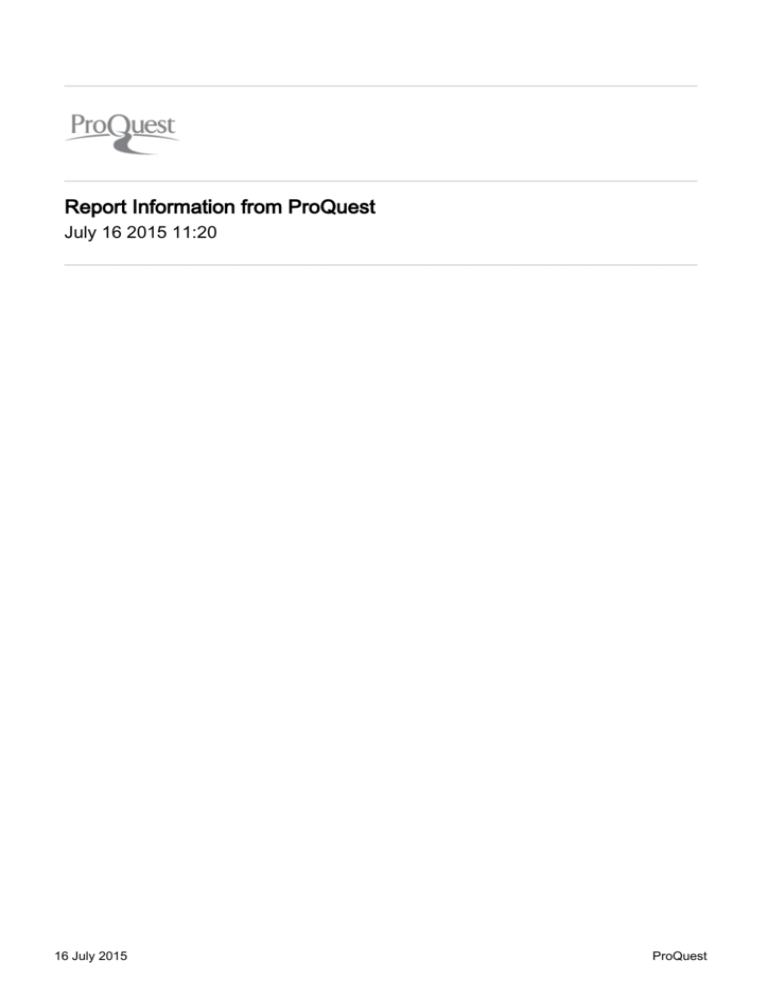
_______________________________________________________________
_______________________________________________________________
Report Information from ProQuest
July 16 2015 11:20
_______________________________________________________________
16 July 2015
ProQuest
Table of contents
1. MSA Teaching Forum Cluster Making It New: Innovative Approaches to Teaching Modernism................. 1
16 July 2015
ii
ProQuest
Document 1 of 1
MSA Teaching Forum Cluster Making It New: Innovative Approaches to Teaching Modernism
Author: Sword, Helen
ProQuest document link
Abstract: Nothing, however, could be further from the truth. Since the founding of the Modernist Studies
Association eleven years ago, teaching-related events have accounted for fewer than 1% of the panels,
roundtables, and seminars on offer at the MSA's annual conference.
Links: Check LinkSource for Full Text, URL to local ILLiad server:
Full text: Most scholars of modernism are also teachers of modernism, and a significant proportion of our dayto-day intellectual labor involves prompting our students to engage with notoriously "difficult" cultural artifacts.
An outsider to the discipline might therefore well imagine that our scholarly conferences and specialist journals
are awash with discussions about this crucial and highly challenging aspect of our work. Nothing, however,
could be further from the truth. Since the founding of the Modernist Studies Association eleven years ago,
teaching-related events have accounted for fewer than 1% of the panels, roundtables, and seminars on offer at
the MSA's annual conference. Likewise, in the fifteen-year history of Modernism/Modernity, this journal has not
published a single article devoted entirely to the teaching of modernism-until now.1
In a field of study that openly welcomes international, multicultural, and interdisciplinary approaches, why has
pedagogy remained such a persistently untrendy-indeed, virtually taboo-subject? The reasons are as complex
and multifarious as modernism itself. Some are economically inflected: most modernist scholars work in
university environments where innovative research earns measurable rewards, whereas innovative teaching
does not. Personal preference plays a role as well; many academics regard disciplinary conferences and
journals as a welcome respite from the daily grind of teaching, which routinely requires them to "dumb things
down" for easy digestion by undergraduates. Finally and perhaps most crucially, literary scholars have in many
cases never been trained to represent teaching as a scholarly activity-that is, as a complex, research-informed,
theoreticallygrounded intellectual practice. Influential pedagogical manifestos such Ernest Boyer's Scholarship
Reconsidered (which seeks to reconfigure teaching as a form of scholarship) and Donald Schön's The
Reflective Practitioner (which argues for the importance of a theorized, reflective pedagogy) have largely
passed our discipline by.2
In an effort to encourage more high-quality discourse around teaching, the MSA Program Committee sponsors
an annual Open Forum on Teaching, now in its fourth year. The inaugural Open Forum in 2006 was titled
"Teaching out of the Archives" (in keeping with the Tulsa conference theme) and featured seven inventive
teachers- Ben Alexander, Michael Coyle, Annette Debo, Amanda Golden, Sean Latham, Jerome McGann, and
Cristanne Miller-discussing how and why they incorporated archival materials into their teaching. At the 2007
Open Forum in Long Beach, a series of brief teaching anecdotes launched an animated debate on the uses and
value of innovative pedagogies. The 2008 Open Forum in Nashville, organized by John Whittier-Ferguson and
Victor Luftig, sought to address some of the broader institutional and socio-cultural issues involved in the
teaching of modernism. All three events drew large, appreciative audiences, suggesting that there is a place for
teaching around the MSA conference table after all.
This "MSA Teaching Forum cluster" seeks to capture some of the energy, engagement, and collaborative ethos
of the 2007 Teaching Forum, which addressed the topic of "Making It New." The contributors to this cluster
represent a range of academic ranks (from graduate student to full professor), institutions (from small liberal arts
colleges to large public universities), and geographical locations (U.S., Canada, U.K., New Zealand). In an
attempt to preserve at least some aspects of our lively, non-linear conversation in Long Beach, each of the six
16 July 2015
Page 1 of 3
ProQuest
panelists was asked to do the following:
1. submit a question about innovative teaching for the other panelists to consider;
2. contribute a brief first-person essay that addresses one of those questions via a specific, concrete teaching
anecdote grounded in theoretical reflection;
3. read and comment on one another's essays, so that the contributions have the texture of an ongoing
intellectual conversation rather than a set piece or lecture.
The resulting exchange captured in these pages substitutes conspicuous indicators of academic heft (e.g.
footnotes, works cited, carefully crafted sentences) for the spontaneity, serendipity, and interactivity that
characterized the live event. What survives intact here, however, is the power of the teachers' voices, resonant
with intelligence, good humor, concern for their students, and an abiding belief in the value of innovative
teaching.
Footnote
Notes
1. Two articles mention the teaching of modernism briefly or obliquely: Charles Bernstein, "Poetics of the
Americas," Modernism/Modernity 3, no. 3 (1996): 1-23 and Rita Felski, "Modernist Studies and Cultural Studies:
A Reflection on Method," Modernism/Modernity 10, no. 3 (2003): 501-517.
2. Ernest Boyer, Scholarship Reconsidered: Priorities of the Professoriate (Princeton: Princeton University
Press, 1990); Donald Schön, The Reflective Practitioner: How Professionals Think in Action (New York: Basic
Books, 1983).
AuthorAffiliation
Helen Sword is Head of the Academic Practice Group at the University of Auckland, where she received a 2008
Teaching Excellence Award for Innovation in Teaching. She has published widely on both modernist literature
and higher education pedagogy. Her books include Engendering Inspiration (1995), Ghostwriting Modernism
(2002), The Writer's Diet (2007) and Pacific Rim Modernisms (co-edited with Steven Yao and Mary Anne
Gillies, 2009).
Subject: Conferences; Teaching; Essays; Colleges & universities;
Publication title: Modernism/Modernity
Volume: 16
Issue: 3
Pages: 471-473
Number of pages: 3
Publication year: 2009
Publication date: Sep 2009
Year: 2009
Section: Introduction
Publisher: Johns Hopkins University Press
Place of publication: Baltimore
Country of publication: United States
Publication subject: Literature, History, Humanities: Comprehensive Works
ISSN: 10716068
16 July 2015
Page 2 of 3
ProQuest
Source type: Scholarly Journals
Language of publication: English
Document type: Commentary
ProQuest document ID: 215649485
Document URL: http://0-search.proquest.com.libcat.widener.edu/docview/215649485?accountid=29103
Copyright: Copyright Johns Hopkins University Press Sep 2009
Last updated: 2011-09-26
Database: ProQuest Central
_______________________________________________________________
Contact ProQuest
Copyright 2015 ProQuest LLC. All rights reserved. - Terms and Conditions
16 July 2015
Page 3 of 3
ProQuest

